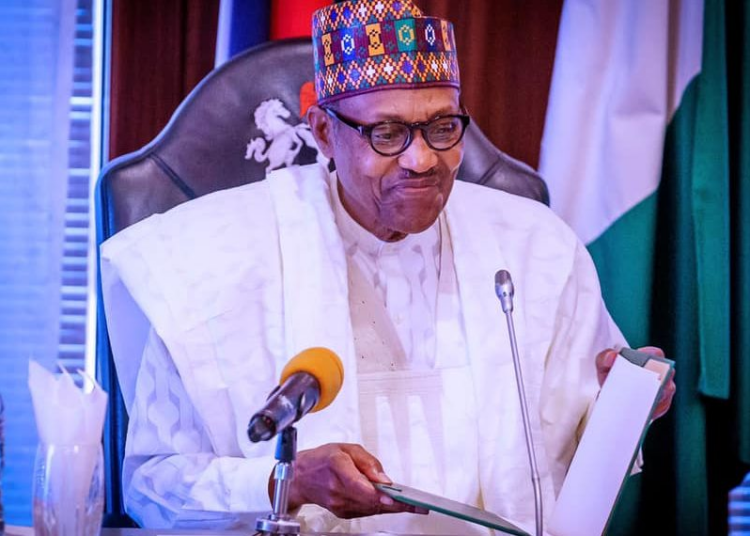Seven days after pleading with Nigerians to give him one week to end the scarcity of new Naira notes, President Muhammadu Buhari has failed to live up to the promise, leading to calls by members of the Council of State and the leadership of the National Assembly to bring back the old notes.
The Central Bank of Nigeria had late last year introduced a policy of redesigning the Naira and gave an initial deadline of January 31, 2023 to completely phase out the 1000, 500 and 200 Naira notes.
Amid scarcity of the new notes and the inability of some Nigerians to deposit their old Naira in banks, the CBN extended the deadline to February 10, 2023, while President Buhari at a meeting with governors of the ruling All Progressives Congress on February 3 asked for seven days to fix the problem.
The failure to meet the seven-day ultimatum is coming amid reports that the Nigerian Security Printing and Minting Company has run out of paper and lacks the capacity the print the needed amount of new Naira notes.
According to a report by an online medium, Premium Times, which quotes sources, the CBN governor, Godwin Emefiele, admitted this to members of the Council of State during its meeting yesterday at the presidential villa, Abuja.
According to the report, the Mint has run out of paper to print N500 and 1,000 notes and is facing supply constraints., with a source adding that the minting company has placed orders with a German firm and De La Rue of the UK (for paper) but the orders are on a long waiting list so cannot be met now.
“The Mint had received CBN’s request to print 70 million copies of the new notes, totalling N126 billion to be pumped into circulation by today,” the source added, regretting, however, that the request could not be met because “the Mint doesn’t have the capacity.”
The Council of State has, however, thrown its weight behind the new Naira note policy, advising the CBN governor, Godwin Emefiele, to make new Naira notes available or recirculate old Naira notes to ease the suffering of Nigerians.
Briefing State House Correspondents at the end of the meeting, presided over by President Muhammadu Buhari, the governors of Taraba and Lagos states, Darius Ishaku and Babajide Sanwo-Olu; and the Attorney General of the Federation and Minister of Justice, Abubakar Malami, said the policy was accepted by members, but the implementation is a serious concern.
Governor Ishaku said: “The CBN was advised to make money available in quantum. The old money can also be recirculated to ease the suffering of the poorest of the poor.”
Governor Sanwo-Olu, on his part, said the chairman of the Independent National Electoral Commission (INEC), Mahmood Yakubu, and Inspector General of Police (IGP), briefed the Council on the state of preparedness for the 2023 general elections, and assured that they were fully prepared.
Malami said: “Relating to the Naira redesign policy, the policy stands but then the council agreed that there is need for aggressive action on the part of the CBN as it relates to the implementation of the policy by way of ensuring adequate provision being made with particular regard to the supply of the Naira in the system.”
The hybrid meeting which lasted for over four hours at the Council Chambers of the Presidential Villa, Abuja, had in attendance former heads of state and presidents, Gen. Yakubu Gowon (retd), Gen. Abdulsalami Abubakar (retd) and Goodluck Jonathan, while former President Olusegun Obasanjo, joined the meeting online.
Two former Chief Justices of the Federation, Alfa Belgore and Mahmud Muhammad, were also in attendance.
Speaking to journalists after a separate meeting with the president, Senate President Ahmad Lawan said that he informed Buhari that the National Assembly had resolved that there should be no cap on the currency swap policy because of the way the scenario is now playing out and how it impacts the constituents who make up their constituency.
He said, “For us in the Senate, initially we felt that this policy, in the first place, is not a bad one. But we also feel there is no need for a time limit; allow the old and the new to co-exist until the old notes are phased out.
“So, what is wrong in that? This is not going to be the first country to deploy it that way; other countries have been doing the same thing. And to say that in three months it will be okay, it is not okay, especially in a country like ours where maybe 80, 85, 90 percent of the population have no access to banks.”
According to him, when Britain changed its currency, it took mover year to change and the old notes remained legal tender.
“So, why ours? We are not cashless yet and that society is cashless already and they needed even more time. So, we should have an open-ended time but what will make it quick is for us to have more and and more of the new currencies and then they co-exist with the old ones until the old die a natural death,” Lawan said.
Withdrawal Limit: Ondo Govt Drags FG To Supreme Court
Meanwhile, the Ondo State government has dragged the federal government before the Supreme Court over the daily cash withdrawal limit policy of the Central Bank of Nigeria.
In the suit filed by the attorney-general of Ondo State, Sir Charles Titiloye, the state is praying the apex court to stop the implementation of the directive issued by federal government through the CBN on limitation of daily cash withdrawals from banks, which, it said, had totally paralysed and brought to a standstill the activities of Ondo State Government and had adversely affected economic and commercial activities in the state.
The state argued that the guideline on daily maximum cash withdrawal made by federal government is an infraction on the legal rights of Ondo state government and its citizens to access funds for execution of developmental projects, small credit facilities to petty traders (who have no account in banks) and highly detrimental to daily commercial activities in the state.
The government urged the Supreme Court to declare that the federal government cannot by the directive issued through CBN amend or vary an existing Act of National Assembly particularly Section 2 of Money Laundering Act, which relates specifically to limitations on cash withdrawals for individual and corporate organisation to N5 million and N10 million respectively.
The updated guidelines issued by CBN now places maximum withdrawal for individual and corporate organisation at N500,000 and N5m respectively.
Naira Swap Crisis: Speak With One Voice, Ex-Govs Tell 36 Govs, Sue For Peace, Unity
The Forum of Former Governors (FFG) has called on the 36 state governors in the country to be united and speak with one voice over the prevailing crisis associated with currency swap policy of the CBN even as the former governors sued for peace and unity among Nigerians.
The Forum noted that the current Naira crisis, and other challenges like insecurity, will pass away as they were just a phase in the nation’s life.
In a statement jointly signed by the Patron and Chairman of the Forum of Former Governors, former Governor Lucky Igbinedion of Edo State, and former Governor Babangida Aliyu of Niger Stat, respectively, on Thursday, the former governors also called on the political elite and other relevant stakeholders to unite and preach peace for the continued corporate existence of Nigeria.
“The past few months has been a trying time for our nation. Our country has been witnessing actions and inactions that call to question the unity, peace and progress of our country. Challenges associated with Naira swap and scarcity crisis, insecurity, have frayed nerves and stretched the fragile nature of our country.
“We call on the governors, in particular, to put aside political differences and speak in unison for the peace and tranquility of our country. The geopolitical and historical implications of an unstable Nigeria is enormous; and has far-reaching implication for the black race,” the governors said.
ASUU: Nigerian Politicians Selfish
The Academic Staff Union of Universities (ASUU) has bashed Nigerian politicians following the Central Bank of Nigeria (CBN) naira redesign policy, describing them as “selfish, unpatriotic and self-renting.”
In a statement signed by the national president of the union, Professor Emmanuel Osodeke yesterday, the union noted that “Nigerians are gasping for breath under the suffocating atmosphere created by the ruling class.”
It also stated government that the federal, state and council levels appeared enamoured of policies which aggravate the suffering of the mass of Nigerians.
“Our union, the Academic Staff Union of Universities, has had cause to condemn the anti-poor policies of government in the education sector.
“While the ruling class virulently attacked ASUU for insisting on government’s adequate funding of universities and paying a morale-enhancing remuneration for Nigerian academics, the children of the poor now know better, going by a gale of anti-fees protests resonating across the campuses.
“Word on the street is that triggers for the new wave of brain drain, called the ‘Japa syndrome’, are not unconnected with the debilitating working and dwelling environment.
“Added to this are the scornful treatments given to academic and medical personnel who other nations handle as treasures of inestimable value, and aversion for collective bargaining evident in anti-labour policies such as ‘no work, no pay’ and ‘divide-and-rule’.”
Osodeke also said the Supreme Court ruling which halted the February 10, 2023, deadline on the naira redesign policy should somewhat mitigate the aggravated suffering of Nigerians occasioned by yet another anti-poor policy.
According to the ASUU leader, the crisis arising from the redesign of the country’s currency reverberated in every sector of the economy and it would require very serious efforts by developmental economists to fully determine the magnitude of its damage.
“The ambush tactic of Godwin Emefiele to ‘eliminate cash’ was applied in India in 2016 with unsalutary consequences. So, ASUU commends the Supreme Court for siding with the suffering Nigerians, whose miserable lives would have been compounded by Emefiele’s policy if they are not sent to their early graves by it,” he said.
We’ve got the edge. Get real-time reports, breaking scoops, and exclusive angles delivered straight to your phone. Don’t settle for stale news. Join LEADERSHIP NEWS on WhatsApp for 24/7 updates →
Join Our WhatsApp Channel









